- Home
- Deepak Chopra
Muhammad: A Story of the Last Prophet Page 2
Muhammad: A Story of the Last Prophet Read online
Page 2
Muhammad gained the summit of the mountain. He spied Mecca in the distance. Why had he pursued God like a falcon after a desert hare? Mecca had hundreds of gods already. They lined the Kaaba, the sacred place, inside and out. One god for every worshiper; one idol for every sacrifice. What right did he have to meddle? There were countless sacrifices, day after day, that lined the town’s pockets. Muhammad could almost smell the smoke from this great height.
Peering down at the rocks below, he trembled. In that moment of his destruction, Muhammad found a prayer that might save him.
Dear God, in your infinite mercy, make me who I was before. Make me ordinary again.
It was the one prayer God could not grant, for in that moment a man’s existence was shattered like a wine cup carelessly trampled in a tavern. He would never be ordinary again. The only thing that mattered from now on would be Muhammad’s words. The Arabs, as lovers of words, were poised. Would they love God’s messenger or revile him?
Muhammad smiled faintly. A Bedouin saying had come to him: “A thousand curses never tore a shirt.” So why should I tear it myself? And my flesh and bones with it? he thought. The image of his body crumpled and broken on the rocks below repelled him.
Muhammad turned away from the brink. If I’m your vessel, handle me with care. Balance me lightly. Don’t let me crack.
I whispered yes. Who was I to deny him? I didn’t even ask God first.
The merchant of Mecca limped with one sandal back down the slope. His tongue was thick and clumsy. Muhammad would recite as I commanded. He would never stop reciting, even if it meant his death.
ONE
THE WATER OF LIFE
1
ABDUL MUTTALIB, “THE SLAVE”
Can God’s love be so intense that it feels like hate?” I asked.
“Don’t speak of God,” my son grumbled. “He isn’t thinking about us right now.”
We were dragging a sledge loaded with water jugs to town. The water, which was brackish and warm, sloshed out whenever we struck rocky ground.
“God thinks about everything, and he does it all at once. That’s what makes him God,” I replied mildly. I looked over at my son, Abdullah, who was yoked to the sledge with a band of rope around his bare chest. It was backbreaking work, and he was in a temper.
We had drawn the worst lot when the water carriers gathered at dawn. Forty young men were sent by the tribes every morning to bring water into Mecca. There were no wells in town, and so water had to be hauled from the small wells that lay on the outskirts. Abdullah and I drew the farthest one, more than a mile away. Yoked like animals, bent low enough to eat the dust beneath our feet, we would be dragging the sledge until after sundown.
No one had pity for me, the old man. They all knew me as “the Slave,” and the name made them treat me with veiled contempt.
“I used to think God hated me,” I said, ignoring Abdullah’s sour temper. “My childhood was full of poverty and woe.”
“It’s a curse to be here now.”
I stopped pulling and spread out my arms. “I am in Mecca, my son, delivered into her holy gates by a miracle. What feels like hatred must be God’s love in disguise.”
Abdullah grunted. He had no interest in his father’s foolish miracle. All he cared about was being awakened out of a heavy sleep to walk through the predawn darkness. He had half a mind to rebel. He was the youngest son of ten, favored and handsome. His noble nose was so large that it touched the wine before his lips did. More than anything, though, he hated that his father, a rich man, bore the nickname “the Slave.”
“If I have to listen to you,” Abdullah said petulantly, “let me walk in the shade.” Water carriers stayed in the shade of houses and walls as much as they could, but now there was only a sliver of cool darkness, just enough for one man to creep into.
“You get the shade on the way back. We tossed for it.”
“On the way back the jugs are empty. It’s not fair.”
I shrugged and leaned into my harness. The sun was at its highest point. The heat burned my skin like a stove.
Love that feels like hate. That riddle had been on my mind for days. To me it was the whole mystery of life, only I hadn’t seen it before. Every curse is a blessing in disguise. Take this land of Arabia. Like a dangling jewel, it lies in the grasp of two empires. To the north the Byzantines hold out their fist, to the east the Persians. Surely that was a curse for a defenseless, scattered people like us. Yet the Arabs have never been conquered. The desert is too vast, too bleak. Wander off the trail for barely an hour, into the wasteland where only jinns and scorpions thrive, and you would be lucky to find your way back alive.
Even there God has shown his mercy, because traders couldn’t sail around Arabia, not with pirates waiting in every cove and harbor. They were forced to march their precious silk and spices across the desert to Damascus. The result was prosperity for any town like Mecca lucky enough to be on their route. The tribes praised the gods and vowed to make sure every traveler had water when he entered the city. Which only led to the next curse, that the water had to be hauled in every day, no matter how many backs it broke.
On and on life goes, like a necklace where one bead is a pearl and the next one poison.
No one wants to hear me babble about it. It was only the noonday sun that made me open my mind to my petulant son. Two nights ago, my obsessions with God’s love became inescapable, and I lay awake with anxiety like a cold fever. I had taken a drastic, foolish step that day. I confessed to my cousins over a bout of wine drinking. It was at one of the tiny inns that cater to pilgrims near the Kaaba, where local men also meet.
“I cannot find a single blessing from God that is not also a curse,” I said. “And no curse that is not also a blessing. Why is this so?”
There was silence. What was I talking about? My cousins only discuss three things: money, women, and camels.
One of them spoke up. “I lost another camel yesterday. Either my slave is faking the numbers, or he is letting raiding parties in for a pretty penny.”
“If he was paid off, they’d take more than one camel,” observed another cousin.
“Perhaps,” the first cousin replied.
But I wouldn’t be put off. “You don’t care if God has cursed us? God has spoken to every people but the Arabs. Are we lost children who will never find our father’s home again?”
The company went silent again. It made them nervous to hear me say “God” instead of “the gods.” “It is so because it is so,” remarked the oldest cousin, who gets exceptionally drunk every day and is exceptionally respected. The others nodded, and the conversation ended there.
I didn’t expect an argument. The inn falls under the shadow of the Kaaba. All the ground around that sacred place is a sanctuary. No tribal fighting can break out there; blood feuds were cancelled; even violent argument has been outlawed. And I am chief of his clan, after all, so my cousins give me respect by listening with serious faces, even though they laugh at me on the inside.
My confession had done me no good. I couldn’t sleep any better. Try and understand. I wasn’t having philosopher’s insomnia. This mystery applied directly to me—it would determine if my whole family survived.
It all began with water, a long time ago, in the age when memory began. After the raging waters of the Flood receded, and Father Noah descended from the ark, he bred a holy line of offspring. From his blood came Abraham, and from Abraham his firstborn son, Ishmael.
Now Ishmael’s mother, Hagar, had only been a slave out of Egypt, belonging to Abraham’s wife, Sarah. Because she was barren, Sarah told Abraham to take Hagar as his second wife in order to have children. Fourteen years later, a miracle came to pass, and Sarah became with child. She bore a son named Isaac. Afterward she demanded that Hagar be driven with Ishmael into the wilderness. Abraham bowed his head and obeyed.
When Hagar was wandering with the young boy, she grew desperately thirsty. There was no shelter under the open sky a
nd no water in sight. Searching for a few drops to moisten Ishmael’s parched mouth, Hagar went back and forth between the two hills known as Safa and Marvah. Ishmael began to cry. She was on the point of fainting, and they both might have perished, but God took pity on Hagar. He sent down the angel Gabriel, who touched the ground with his finger. At that spot the earth grew dark with moisture, and then the faintest trickle of water appeared. A miracle! Hagar bent down and drank, first cupping her palm to scoop water up for the boy.
As it is related, either Hagar or the angel said, “More. Let the waters accumulate,” which in Arabic caused the well to be named Zamzam, “the water that accumulates.” Mecca grew up around it. As a sign of God’s favor, Ishmael and his heirs had sole possession of the well and the right to sell the water for all time.
When I was a boy and first heard the story, I wouldn’t have questioned a miracle. Couldn’t I walk up to the Kaaba and touch its walls, where every stone is a miracle? Abraham had built it, the House of Allah, near where the well bubbled up. It was exactly like the first building that Adam had put up with his own hands, made of granite blocks and perfectly square on all sides. Arabs began to call it Kaaba. Through every tribal war and every invader’s attempt to vanquish us, it remained the House of God, long after the well of Zamzam, once the perpetual spring, had disappeared, for even Zamzam had a curse upon it, although it was many generations before anyone found out.
I looked over at Abdullah, who had taken to muttering under his breath. He was twenty and brawny enough for hauling water, but this was his first time. He had begged me to tell him why we were doing this menial drudgery, not even allowing ourselves a donkey cart. But I would say only one word, “Later.”
“Take my shade,” I offered.
“Your shade? Is that what you call it?” Abdullah was as proud as a rich man’s son ought to be.
Ignoring the rebuke, I pushed him into the shade of a high wall that circled a courtyard. Our own courtyard was the nearest to the Kaaba, a great mark of rank. Water had made me rich, but the seasoning to the feast was the envy others felt for me. I could taste it when I strolled to the marketplace every morning.
I said, “I’ve never told you about the miracle that brought me to Mecca. It’s time you learned.”
Abdullah didn’t look surprised. I had made the same speech to each of my ten sons when they reached a certain age. “Your grandfather, Hashim, was the chief of our tribe. He preciously guarded the right to haul this water, which brought him revenue from every pilgrim and a tithe from all the other tribes in Mecca. As a boy I had no knowledge of this, because Hashim died mysteriously while taking a caravan to Egypt. My mother tied me up in a bundle and ran away, suddenly penniless and without friends. Hashim’s brother had claimed his fortune. I, his oldest son, was pushed aside.”
Abdullah didn’t question these events. When a woman’s husband dies, it is permitted for his brother to inherit his property if there are no grown sons.
“I grew up forsaken in a faraway town, creeping like a snake between heaven and earth. In the eyes of all Arabs I was an orphan. I was nothing. The lowest point in life is exactly when God bestows his miracles,” I said. “Are you ready to hear mine? Without it, you wouldn’t be here, handsome as you are.”
Abdullah grimaced. I was enjoying the power my story had over him. I went on. “Some years passed. My uncle, Al-Muttalib, suddenly became horribly guilty. He had grown wealthy from Hashim’s right to carry water, yet he had deprived Hashim’s son of his share. Guilt wouldn’t leave him alone; it was relentless. Therefore Al-Muttalib decided that this was a sign. Without a word to anyone, he rode away from Mecca, found me with my mother in exile, and lifted us from the dust. He promised to treat me like a second son. Two days later I rode before him as Al-Muttalib reentered Mecca. Yet people couldn’t believe that this dirty boy who couldn’t even sit up on a camel was anything but a new slave being brought home. On all sides they called me Muttalib’s slave: Abdul Muttalib.”
“And that is our shame,” muttered Abdullah. He has always been quick to draw his dagger if another young male ridiculed his father’s insulting nickname. Out of habit everyone had forgotten my real name, Shaybah, and dubbed me “the Slave.”
With a grunt I leaned into my harness. I’m still strong. I’m not yet fifty. Yoked beside me, Abdullah had no choice but to keep up. For a while we silently dragged the sledge. And he didn’t offer to surrender the shade.
“I have given you knowledge today. So please answer me now. Can God’s love be so intense that it feels like hatred?” I asked.
My son knew to take the question seriously. “The answer doesn’t lie with God. It lies with your own guilt.”
“Explain.”
“If you cheated on my mother, maybe she would find out, maybe she wouldn’t. But in your guilt, you could feel her love as disguised poison. And if a man kills his brother, as Cain killed Abel, his guilt might make God’s love feel like hate.”
“A good reply,” I said. “But I am welcome in my wife’s bed without sin, and I’ve killed no one. I thought that being rich is a blessing, but I was a fool.”
Abdullah regarded me in disbelief, but I didn’t let him interrupt. “You think my riches aren’t a curse? That’s why I came today to the gathering place to draw lots. I wanted to see for myself what this backbreaking work is like. Look at me. After half a day I’m ready to drop in the dirt and perish. Do you see what that means?”
Abdullah had no idea what it meant, unless it was that his father perversely wanted to suffer.
I read his thoughts. “For one moment forget your vanity. Even if I don’t die from this ordeal myself, many young men will. I’ve seen their bodies wither; they fall sick. Stronger clans will easily wipe us out, or we will die out on our own, before our time.”
“What can we do, sir?” Abdullah asked, for the first time showing respect. Among us Arabs, nothing is more important than the tribe. Ours was the Quraysh, the largest and most powerful in Mecca, which means that its downfall is in the prayers of every other tribe. It was unbearable for Abdullah to think of his whole race being annihilated one day.
“Zamzam,” I murmured. “That is what we will do.”
“What?” My son knew the name—everyone in Mecca did—but it was as legendary as Eden. He hadn’t wasted a moment thinking about the water of life, as the elders called it, still less what it meant to lose it.
I said, “I have to find the well again. Once I do, there will be endless water right in the heart of town. We Quraysh will no longer pay for our wealth with our lives. What do you think of that?”
Abdullah was tempted to think his father had gone mad. I could see that. But he didn’t dare say so. “You are asking God for a second miracle,” he replied cautiously. “Perhaps that’s one too many.”
I laughed. “I swear, if I am ever made chief of chiefs throughout Arabia, you will be my ambassador. Such smooth diplomacy. Wait until the women hear you.”
At this Abdullah brightened. As the handsomest of my sons, he had attracted glances from the girls all his life. But this was the first time I’d spoken of letting him approach a woman. Marriage couldn’t be far off.
We had talked so long that we were close to the cistern by now where the water was needed. This particular cistern was a shallow stone tank no more than eight feet across. When we arrived, two dozen women were waiting with clay water jugs on their hips. At the sight of the sledge, they let out the piercing warbled cry of tribal nomads.
“There you go. More women than you can handle,” I said.
I felt so wrung out that I let my vain, disgruntled son empty the heavy jugs from the sledge. Most of the water went to the waiting women, leaving barely two or three inches in the cistern. A cluster of palm trees nearby would shade it enough so that the heat didn’t steal everything. I liked this place. I admired the palms, which survived cannily on the drops spilled by water carriers and careless women running back to their families.
I rubbed
my chest where the rope harness had left burn marks. “Zamzam,” I muttered softly. Could I really find it again? The truth is, I didn’t have the courage to mention my mad plan to my cousins, or even my wife. The men of our tribe would be justified in stripping away my fees. A lunatic has no business with sacred water rights.
Maybe God himself was against me. To everyone in Mecca, Zamzam had disappeared as divine punishment. One night, long before anyone living can remember, a righteous man became outraged by the greed and insolence of the rich and impious Meccans. No one knows his name. He furtively entered the Kaaba and stripped it of gold offerings and sacred idols. Even though Allah was God, the one and only, the tribes had forgotten him and lined the sacred place with their own gods, hundreds of them.
After throwing his loot into the well, the thief covered Zamzam over with earth, burying it from sight. He uttered a prayer that the well never be found by the unrighteous. God must have listened, because when the sun came up the next day, no one could remember where Zamzam was. The rich despaired; a few even repented. But they were lost. Mecca dwindled without its precious water. The sons of Ishmael departed. The place became desolate for centuries, until the Quraysh revived the town. They established the system of carrying water from the outlying brackish wells. They rebuilt Mecca, provided inns for pilgrims, and made the Kaaba a proper house of worship as before. All of which entitled them to be called the new sons of Ishmael.
“Can we go home now?” asked Abdullah. His eye was fixed on a pretty maid swaying her hips as she walked away.
“You won’t catch her stinking the way you do,” I said.

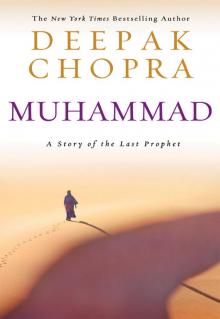 Muhammad: A Story of the Last Prophet
Muhammad: A Story of the Last Prophet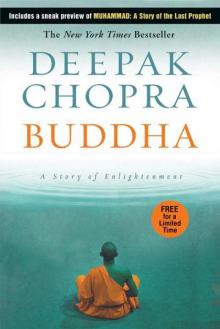 Buddha
Buddha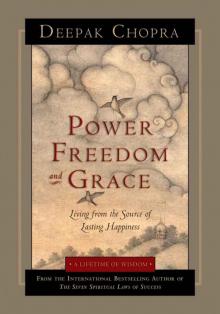 Power, Freedom, and Grace
Power, Freedom, and Grace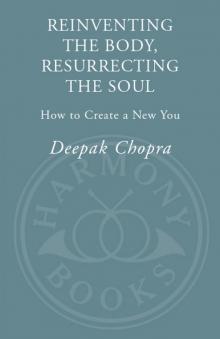 Reinventing the Body, Resurrecting the Soul: How to Create a New You
Reinventing the Body, Resurrecting the Soul: How to Create a New You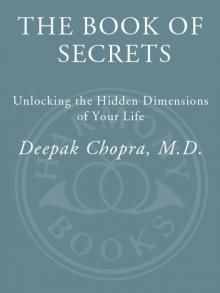 The Book of Secrets: Unlocking the Hidden Dimensions of Your Life
The Book of Secrets: Unlocking the Hidden Dimensions of Your Life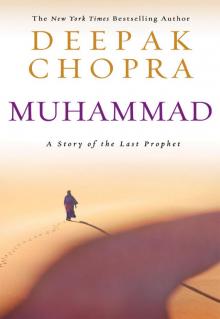 Muhammad
Muhammad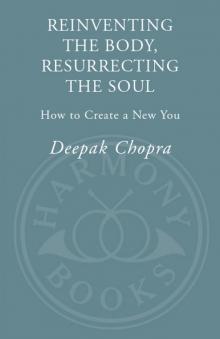 Reinventing the Body, Resurrecting the Soul
Reinventing the Body, Resurrecting the Soul